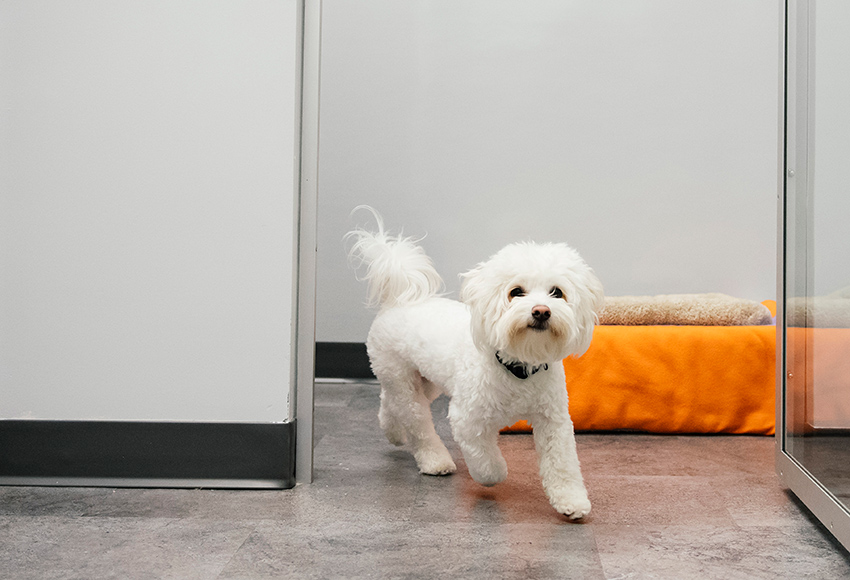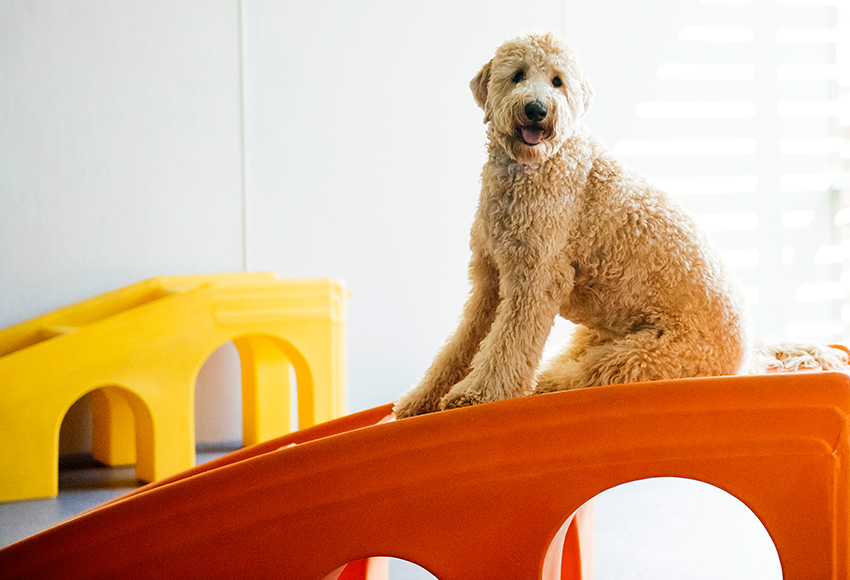Keeping Your Dog Safe During the Holidays

It’s beginning to look a lot like Christmas! This season, your home is sure to be filled with fun and holiday cheer. It’s important to consider your pet’s safety when decorating or preparing holiday meals. Here is a list of Christmas cautions to keep in mind when living with cats and dogs.
Decorations
Many pets find holiday decorations very appealing. However, this can lead to various types of injury
Ornaments – Pets may think these are toys and ingest them and/or choke on them. Glass ornaments can cause cuts on paws and to the mouth and digestive tract if swallowed. They can also get stuck in the GI tract and need surgical removal.
Tinsel/Ribbon/Garland/Wrapping Paper – Pets often find tinsel and ribbon intriguing. This is especially true for cats. If ingested, any of these items can get trapped in the intestines. This requires immediate veterinary attention and can be life threatening if not addressed.
Potpourri – The festive scent can entice pets to investigate. Make sure containers are covered or not accessible. If ingested, potpourri can cause GI upset (vomiting and diarrhea)
Christmas Tree Water – May pets love to drink water in the tree stand. Be cautious if you use chemicals in the water to preserve the life of your tree, as these can be harmful to your pets.
Lights/Candles/Electrical Cords
The glow of lights and candles add a warm touch to dark, wintry nights. Our furry friends, however, may see things differently.
Candles or Fireplaces – Any type of flame candle or fire can cause a burn risk to our furry friends.
Wires/Electrical Cords – Pets may think lights or cords are toys. They may chew them and experience an electrical shock (which can be life-threatening), or create a fire risk.
Holiday Plants
Holiday plants may be confused for food by our pets. Side effects include gastrointestinal irritation, vomiting, and diarrhea as well as more life-threatening conditions. Be especially cautious of the following if you choose to display them in your home:
Lilies– (all varieties, including Easter Lily, Amaryllis): these can cause acute renal (kidney) failure in our feline friends. It is very important if your cat eats any type of Lily plant that you seek immediate veterinary care.
Mistletoe – Mistletoe is well-known for causing severe intestinal upset, as well as a sudden and severe drop in blood pressure, breathing problems, and even hallucinations (unusual behavior). If a large enough amount of these plants is ingested, seizures and death may follow. The leaves and berries of holly and mistletoe plants, even the dried plants, should be kept well out of your pet’s reach, or kept out of the home altogether.
Poinsettias – A lot of people have been led to believe that the poinsettia plant is deadly for pets and children, but this is actually an unlikely occurrence. The poinsettia plant’s brightly colored leaves contain a sap that is irritating to the tissues of the mouth and esophagus. If the leaves are ingested, they will often cause nausea and vomiting, but it would take a large amount of the plant’s material to cause poisoning. However, if the plant has been treated with a pesticide, your pet could be at risk of becoming ill from ingesting the pesticide. Severe reactions to the plant or to the pesticide it has been treated with include seizures, coma, and, in some cases, death.
Holly – Symptoms of illness from ingesting these plants include intestinal upset, such as vomiting and diarrhea, excessive drooling, and abdominal pain. The leaves and berries of Holly plants, even if dried should be kept well out of your pet’s reach or your home altogether.
Pine tree needles and sap – The oils produced by fir trees can be irritating to a pet’s mouth and stomach, causing excessive vomiting or drooling. The tree needles, meanwhile, may cause gastrointestinal irritation, obstruction, and puncture. Additionally, the water used to nourish Christmas trees can be noxious. Bacteria, molds, and fertilizers can cause your pet to become extremely sick with only a few laps.
Christmas Cactus – Fortunately, the Christmas Cactus (or its relative, the Easter Cactus) plant is not toxic to dogs in either its parts or flowers. The same lack of toxicity applies for cats. However, fibrous plant material can cause irritation to the stomach and intestine, leading to vomiting or diarrhea.
Food
There are two groups of food to avoid feeding your pet. One is high-fat foods which can lead to pancreatitis (inflammation of the pancreas) and can affect both dogs and cats. The other group is toxic foods which require an immediate visit to the veterinarian.
High Fat Foods Toxic Foods
- Turkey (dark meat) Uncooked bread dough
- Buttery/Fried Dishes Raisins and Grapes
- Desserts Onions
- Gravy (sugar substitute in gum and candies)
Chocolate (dark chocolate is more toxic than milk chocolate)
And please remember that even though your dog loves to be included in the Christmas fun, it may be too much sometimes. If your pet seems stressed from the hustling and bustling — and many do — have a safe place for him or her away from all the activities. Be sure to have a soft area for sleep, a toy or two, water, and food at their disposal. It’s very important that our dogs have a place to go and lay down and be by themselves.







